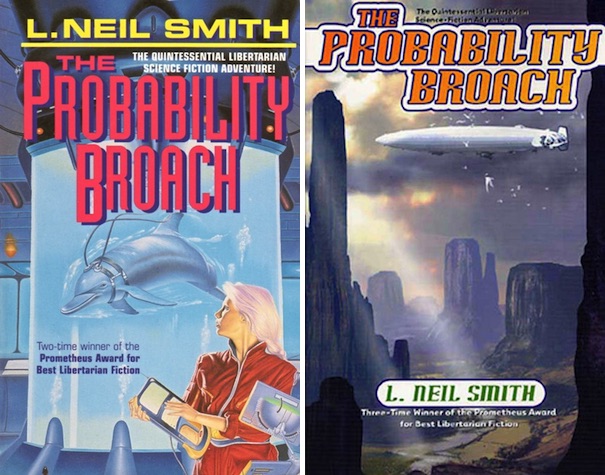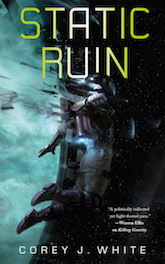In this bi-weekly series reviewing classic science fiction and fantasy books, Alan Brown looks at the front lines and frontiers of the field; books about soldiers and spacers, scientists and engineers, explorers and adventurers. Stories full of what Shakespeare used to refer to as “alarums and excursions”: battles, chases, clashes, and the stuff of excitement.
Today, we’re going to look back at the work of L. Neil Smith, an author whose fiction is full of “alarums and excursions.” The Probability Broach was his first novel, published by Del Rey books in 1980. The book takes its main character, a police detective named Win Bear, out of a dystopia with an oppressive government and thrusts him into an exciting alternate world that has very nearly dispensed with government altogether. Smith’s writing voice is witty, snarky, and entertaining, and there is always plenty of action to keep the story moving.
Of course, L. Neil Smith isn’t just an author known for writing alternate histories (and a trilogy of books about Star Wars character Lando Calrissian), but also for the political bent of his fiction. From the earliest days of Jules Verne and H. G. Wells, science fiction has been a literature of ideas, and often a home to stories with a political message. One of the most prevalent strains of political thought running through science fiction reflects the philosophies traditionally associated with libertarianism. Even readers who do not subscribe to libertarian beliefs may admit that the tenets of personal freedom and individual autonomy—and the occasional touch of anarchy, with characters armed to the teeth and free from legal restrictions—make fertile ground for fictional adventures.
In the early 1980s, I worked in a variety of jobs in Washington, D.C., and it was here that I encountered Smith’s work. During that time, spending an evening here and there reading a book set in worlds of free-wheeling anarchy was often a refreshing break from the sluggish bureaucracy I worked in during the days. While I am a political centrist myself, I always enjoy reading works that advocate different points of view, especially when they do so in an entertaining manner. The copy I read for this review is a trade paperback edition reprinted by Tor/Orb Books in 2001.
About the Author
L. Neil Smith (born in 1946), is an American science fiction writer who first appeared in print with a paperback original, The Probability Broach, in 1980. This novel introduced readers to his tales of the North American Confederacy, a parallel world where a much looser libertarian government emerged out of the American Revolution. The earlier books take place within our solar system, while subsequent books extend the reach of this civilization out into the stars and feature encounters with alien races. The books are notable for the aforementioned heavy doses of libertarian philosophy, but also for Smith’s wit and ability to write absorbing action sequences. The North American Confederacy books include The Probability Broach, The Venus Belt, Their Majesties’ Bucketeers, The Nagasaki Vector, Tom Paine Maru, The Gallatin Divergence, Brightsuit MacBear, Taflak Lysandra, and The American Zone.
After The Empire Strikes Back hit theaters, Smith was selected to write three tie-in novels that detailed the early adventures of Lando Calrissian before he met Han Solo: Lando Calrissian and the Mindharp of Sharu, Lando Calrissian and the Flamewind of Oseon, and Lando Calrissian and the Starcave of ThonBoka. The adventures in these three books received some additional attention recently when they were mentioned by the character Lando while dictating his memoirs in Solo: A Star Wars Story.
Other books by Smith that do not fit into his North American Confederacy universe include The Wardove, a post-apocalyptic novel, The Crystal Empire, an alternate history which non-European cultures emerge as the dominant powers in the world following the Black Death, and two adventures featuring pirates in space, Henry Martyn and Bretta Martyn, which quite strongly evoke the works of Raphael Sabatini. While Smith sometimes writes at shorter lengths, the majority of his published works have been novels.
Smith’s fiction has often been recognized by various libertarian science fiction literary awards, and The Probability Broach won the Prometheus Award for Best Libertarian SF Novel in 1982.
The Probability Broach

Edward William Bear, or Win, is a homicide Lieutenant in the Denver Police Department of a United States that is not quite the same as our own nation. In this United States, some of the disturbing trends of the 1970s have gotten worse. There are constant budget shortfalls, economic stagnation, and energy shortages. A fascistic Federal Security police force enforces laws nationwide, and ordinary citizens are required to carry travel papers. Win is an ‘everyman’ kind of a guy, short, balding, a little heavier than he wants to be, just doing his best to struggle through life. He is called to a crime scene and finds a college physics professor, Vaughn Meiss, gunned down on a street. The man has a strange gold coin in his pocket, along with a card stating he is a member of the Colorado Propertarian Party.
Win visits the Propertarian Party headquarters to find a group of intellectual idealists who talk to him about their philosophies, espousing positions on property rights, anarchy, and limited government. Their leader, Jenny, gives him a book on their principles and urges him to read it. Win returns to work and his boss, Mac, tells him the Feds want him off the case. Shortly thereafter, Mac is murdered in the parking lot. Win returns home to find his apartment wired with a bomb, which he defuses. He decides to visit the university to find out what Meiss was working on, and why it’s led to so many deaths.
Win meets Doctor Bealls, who reluctantly takes him to Meiss’ laboratory. While Win is checking it out, he is attacked again—there is an explosion, and when he regains consciousness, he finds himself lying in the middle of a lawn. At first, he thinks he was thrown out of the building by the explosion, but soon realizes that he is now in a whole new world, and guesses that he has traveled through time into the future. Every person he encounters is armed, and when he finds a phone booth, it contains a terminal that is like nothing he has ever seen before. The operator doesn’t even know what the city of Denver is, but mentions colonies on the moon and asteroids. He is connected with an online directory, and while looking through it, he comes upon a listing for Edward W. Bear with a nearby address and the title “Consulting Detective.” He sets out to visit himself, only to have a passing hovercraft fire upon him; he is grievously wounded.
When Win awakens again, he is in bed being treated by a beautiful medic, Clarissa, who brings capabilities exceeding those of our own most advanced hospitals into people’s homes. He meets an elderly neighbor, Lucy, and then he comes face to face with his twin from this world, Ed. And as they talk about their worlds, Win realizes that this is not the future—it is an alternate world, where the Whiskey Rebellion was a success, George Washington was executed as a traitor, and the Constitution thrown out and replaced by a loose confederacy. This confederacy had banned slavery, which prevented the Civil War, and soon spread to encompass the whole continent, becoming known as the North American Confederacy. Its volunteers fought against dwindling bastions of autocracy around the time of our World War One, and when the Russian Czar fell in the 1950s, libertarian ideals swept away all the world’s previous forms of government. Because there are no pesky taxes or regulations, technology has evolved far beyond what you see in our world, with fusion-powered zeppelins crossing the skies, hovercrafts replacing cars, rockets taking settlers throughout the solar system, and prosperity everywhere. People have discovered that simians and porpoises were more intelligent than previously thought, found ways to allow them to communicate, and granted them citizenship.
Buy the Book


Static Ruin
Of course, this would be a pretty short and boring book unless there was a fly in the utopian ointment, and those folks who’ve been trying to assassinate Win are the flies in question. The technology that allowed Win to travel between alternate worlds was not destroyed by the explosion when he passed through, and thugs of the Federal Security Police have reached out to dissidents in this new world to foment trouble. These dissidents are known as Hamiltonians, and cling to the ideals of a strong Federal government that Alexander Hamilton so vigorously espoused before people came to their senses. The Hamiltonians not only support strong central government, but believe that they are the best ones to be in charge of it.
I won’t go into all the details here, but the rest of the book pits Win and his new friends against those forces of autocracy, with lots of gunfire, kidnapping, spying, break-ins, and even an extremely rare convening of the Confederacy’s congress to address the crisis. We even get a moment where a character argues that the right to bear arms should of course cover all weapons, right up to atomic bombs. Smith does a great job of evoking the feel of a comic book with his prose (and as a comic book reader, I mean that as a compliment). The plot moves at a breakneck speed, everything feels heightened and exaggerated, and there is a sense of fun and excitement throughout—so much so that you almost don’t notice those obvious nuggets of philosophy interspersed with the adventure.
I would definitely recommend this book to readers unfamiliar with Smith’s work. If you enjoy it, you have a whole series of adventures in a similar vein that you can also read, and the narratives take his North American Confederacy and its ideals out into the solar system, to other stars, and even to encounters with alien races.
Final Thoughts
For a first novel, The Probability Broach is remarkably well crafted. Smith’s ability to tell a good story, and tell it in an entertaining way, serves him well, and allows him to advocate the ideas he holds so passionately.
And now it’s your turn to comment. What are your thoughts on The Probability Broach and Smith’s other works? If you read them, did you enjoy them as much as I did?
Alan Brown has been a science fiction fan for over five decades, especially fiction that deals with science, military matters, exploration and adventure.










